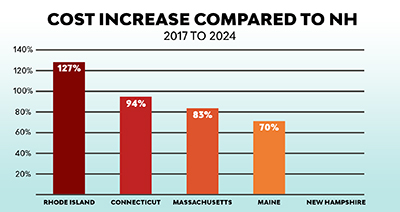Press Release
Contact
DATA: New Hampshire Energy Policy Mitigates Rising Costs for Ratepayers
Concord, NH – Data from the Energy Information Administration's (EIA) "Electric Power Monthly" reports finds that residential electric rates in Connecticut, Maine, Massachusetts, and Rhode Island have all increased at a substantially greater rate than New Hampshire from 2017 to 2024.
The data finds that on a cents-per kilowatt-hour basis for residential customers:
- Rhode Island rates have increased 127% more than New Hampshire
- Connecticut rates have increased 94% more than New Hampshire
- Massachusetts rates have increased 83% more than New Hampshire
- Maine rates have increased 70% more than New Hampshire
"While other states have let politics drive policy, New Hampshire has always put the ratepayer's bottom line first," said Governor Chris Sununu. "We've let markets, not government, drive innovation. We've taken a technology neutral approach that doesn't pick winners and losers, and because of it, residential customers across New Hampshire have benefitted."
While other New England states have enacted policies to force a market transition to clean energy at the expense of ratepayers, New Hampshire's results-oriented approach is delivering reliable electricity while allowing the market to select the appropriate resource mix. Without mandates, carbon emissions from electric generation have still drastically fallen in New Hampshire. In their recent Priority Climate Action Plan, the New Hampshire Department of Environmental Services found that New Hampshire has experienced a 73% reduction in greenhouse gas emissions in the electric generation sector from 2005 to 2021.
New Hampshire's energy approach has resulted in direct consumer cost savings. Currently, Eversource residential customers in Boston, Massachusetts pay a per kilowatt-hour rate 77% higher than Granite Staters, while Connecticut Eversource residential customers pay a rate 45% higher than their New Hampshire counterparts.
That means, for an average household using 625 kilowatt hours a month, Massachusetts families are currently paying almost $90 more a month while Connecticut families are paying $50 more a month than New Hampshire.
"New Hampshire's wise policies have protected our consumers, unlike the policies of our neighboring states in the region," said Senate President Jeb Bradley.
"Because of sound energy policy implementation under Republican leadership, New Hampshire's ratepayers are in a better position than our New England counterparts," said Speaker Packard. "By preventing and removing unnecessary regulations and minimizing the costs that can be passed on to ratepayers, this analysis validates that Republican energy policy has worked."
Public Policy Matters
Public policy is the most significant difference between the states.
"The data shows that New Hampshire's energy policy focus on reliable access to energy and ratepayers savings is paying dividends," said Department of Energy Commissioner Jared Chicoine. "If anything is clear, it is that New England as a whole would benefit from adopting our approach."
In Maine, according to the Portland Press Herald, "Costs related to net energy billing, which provides generators with credit for renewable power they produce and send to the electric grid, have increased from $98 million last year and $7.5 million in 2022. It's the result of state legislation encouraging the use of renewable energy."
In April of this year in Connecticut, regulators approved a significant increase in the Rate Adjustment Mechanism. According to the CT Examiner, "Starting July 1, Eversource residential customers in Connecticut will pay an average of $48 more in charges related to government mandates…"
The Massachusetts Department of Energy's Annual Compliance Report found that the state's multiple renewable mandates (Massachusetts Renewably Portfolio Standard, Massachusetts Alternative Energy Portfolio, Massachusetts Clean Energy Standard, and Massachusetts Clean Peak Standard) resulted in a combined cost of over $1 Billion to ratepayers in 2021. That will only grow in coming years.
The result is an unfortunate reminder that bad energy policy can have drastic, costly effect on fix and low-income families.
Note: Questions regarding New Hampshire's energy policy should be directed to New Hampshire Department of Energy Deputy Commissioner Chris Ellms Jr. at christopher.j.ellmsjr@energy.nh.gov.




